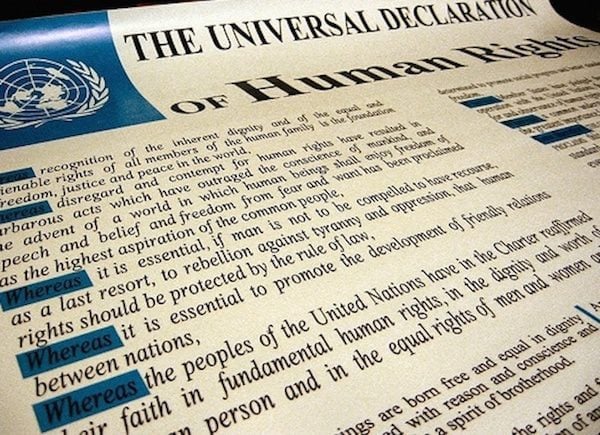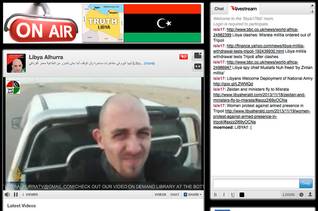Latest Articles
Below are the latest articles by acclaimed journalists and academics concerning the topic ‘Human Rights’ and ‘Libya’. These articles are posted in this country file or elsewhere on our website:

The concept of human rights has become a well-known and widely accepted term to use. Varying interpretations are possible, with differences usually being based on cultural background. Nonetheless, most of these understandings consciously or subconsciously include the basic rights outlined in the United Nations’ Universal Declaration of Human Rights. The United Nations General Assembly (GA) adopted the Universal Declaration of Human Rights on December 10th, 1948. It was written in the aftermath of World War II, “… as a common standard of achievement for all peoples and all nations, to the end that every individual and every organ of society, keeping this Declaration constantly in mind…” Thus it was truly meant to be universal, to protect citizens from any type of violation the world had recently experienced, as outlined in the Preamble and 30 Articles.
As such, it includes articles on the right to life in dignity; liberty and security; freedom of movement; right to nationality and education; just treatment of human beings and respect; as well as freedom of expressions and opinions, from torture or inhumane treatment, as well as economic, social and cultural rights.
The Declaration is not legally binding, but is the basis of international human rights law. Two binding UN covenants were formed as a result of the UDHR; the International Covenant on Civil and Political Rights and the International Covenant on Economic, Social and Cultural Rights. Combined, these three documents are often referred to as the “International Bill of Human Rights”.
Over the years other conventions have been written to expand on and add to this fundament, focusing on a variety of topics such as refugees (1951 and 1967), discrimination of women (‘CEDAW’, 1979) and disabled persons (2008), against torture (1987), protection of migrant workers (1990), and against racial discrimination (1969) to name a few.
Additionally, the International Labour Organization has compiled a large number of conventions specifically related to work force and labour standards, of which 8 are considered ‘fundamental conventions’ and relate to freedom of association (1948, C087), collective bargaining (1949, C098), forced labour (1930, C029 and 1957, C105), minimum age (1973, C138), child labour (1999, C182), equal remuneration (1951, C100), equal opportunity and treatment (C111).
The Geneva Conventions are a revision of previously constructed conventions, adjusted after WWII and specifically focus on treatment of persons in time of war. It consists of four Conventions, and three additional protocols. The International Committee of the Red Cross (ICRC) explains that the Conventions “aims at ensuring that, even in the midst of hostilities, the dignity of the human person, universally acknowledged in principle, shall be respected.”
During a series of expert meetings, congregations by Red Cross agencies, and a confluence of government representatives over time, the articles were revised until a draft was represented at The Diplomatic Conference for the Establishment of International Conventions for the Protection of Victims of War in 1949. The Final Act was signed by fifty-nine nations, some of which no longer exist, and has attained more signatories since.
The Cairo Declaration on Human Rights in Islam (CDHRI) was compiled by the Organisation of Islamic Cooperation (OIC) in 1990, during the 19th Islamic Conference of Foreign Ministers in Cairo, and has 57 signatories. This Declaration holds similar – if not identical – principles as the UDHR, but notably also included articles related to ‘jus in bello’ – acceptable wartime conduct, alike the Geneva Conventions. The CDHRI also addresses equality between women and men, rights of the child, freedom, right to medical care, right to self-determination, amongst others. Most notably is that this 25 Article document clearly lists the Sharia as reference point including for punishment. The CDHRI has been adopted by 45 countries, out of the total 57 members of the OIC.
Conventions Signed By Libya
Libya signed the Conventions on 22 May 1956, Additional Protocol I (Protection of Victims of International Armed Conflicts) and Additional Protocol II (Protection of Victims of Non-International Armed Conflicts) on 7 June 1978. Moreover, Libya became signatory to the Convention for the Rights of the Child (CRC) on 15 April 1993, as well as the Optional Protocol to the CRC on 29 October 2004.
Libya has been member of the OIC since 1969, and signed all 8 fundamental ILO conventions.
The Convention relating to the Status of Refugees is based off Article 14 of the UDHR, and recognizes the right of asylum and protection of refugees. It was approved during the General Assembly meeting of December 14, 1950 and came into force on April 22, 1954. However, the original Convention limited its scope to refugees fleeing prior to 1 January 1951. As such, an additional protocol was compiled in 1967, removing these limitations.
Libya is not party to the 1951 Convention, nor its Protocol.
The Convention on the Elimination of All Forms of Discrimination against Women – also called CEDAW, was approved during the General Assembly Session on 18 December, 1979 and entered into force on 3 September 1981. Libya acceded to CEDAW on 16 May, 1989. Through “accession” a state accepts the offer or the opportunity to become a party to a treaty, which has already negotiated and signed by other states. It has the same legal effect as ratification. Countries that have ratified or acceded CEDAW are legally bound to put its provisions into practice, and thereby agree to submit national reports on measures taken to comply with its obligations. Such reports are to be compiled at least every four years.
Reservations were made by Libya on the date of accession, against Article 2, stating due regard must be made for Sharia norms pertaining t inheritance; Article 16 paragraph (1c), prescribing the same rights and responsibilities during marriage and upon dissolution; and (1d), prescribing equal rights and responsibilities for both parents regardless their marital status. The reservations to the paragraphs of Article 16 state prejudice to rights of women granted by the Sharia cannot occur.
The Convention on the Rights of Persons with Disabilities was approved during the General Assembly session on December 13, 2006 and came into force on May 3, 2008. Simultaneously, the Optional Protocol was approved, giving the Committee on the Rights of Persons with Disabilities (CRPD) competence to examine individual complaints with regard to alleged violations by States parties to the Protocol. The CRPD is the body of independent experts that monitors implementation of the Convention. Libya signed the Convention on May 1, 2008 and is not party to the Optional Protocol.
The Convention against Torture and Other Cruel, Inhuman, or Degrading Treatment or Punishment, also referred to as just the Convention against Torture, was adopted during the General Assembly session on December 10, 1984. On June 26, 1987 it was registered and thereby came into force. Its implementation is monitored by the Committee Against Torture (CAT), composed of ten individuals of various nationalities. All signatory states are obliged to send regular reports to the CAT, based on which recommendations are made. Libya acceded to the Convention on May 16, 1989 with no reservations.
The International Convention on the Protection of the Rights of All Migrant Workers and Members of their Families was approved by the General Assembly on December 18, 1990 and entered into force on July 1, 2003. Libya became party to the Convention by accessing to it on June 18, 2004 with no reservations.
The Convention on the Elimination of All Forms of Racial Discrimination was approved by the General Assembly and accordingly opened for signature on March 7, 1966. It entered into force on January 4, 1969. Despite the obvious as stated in the Convention title, it aims to obliterate hate speech and promote understanding. Implementation of the articles is monitored by the Committee on the Elimination of Racial Discrimination, to which bi-annual reports are submitted by each signatory. It also is responsible for handling inter-state and individual complaints related to non-conformity to the provisions of the Convention, as prescribed in Article 14.
Libya acceded to the Convention on July 3, 1968. In its reservations it lists that it does not consider itself bound to the provisions of Article 22, pertaining to inter-state dispute resulting from interpretation or implementation of the Convention, stating that all parties to the dispute are to expressly consent to intervention of the International Court of Justice. Additionally, it notes that accession of the “Kingdom of Libya” to the Convention does not imply recognition of Israel, nor its entrance into any treatise therewith.
The Gaddafi government was well known for both its public commitments to human rights and its gross violations of them. As early as 1988 Gaddafi made a point of criticizing the Revolutionary Committees for their repressive behaviour and issued laws allowing freedom of expression, but these were more posturing than real change. There were several high-profile examples of human-rights abuses in the 1990s. One was a massacre in 1996 at Abu Salim Prison in Tripoli, in which Human Rights Watch estimated 1,270 prisoners were killed. Another was the rigged trial of five Bulgarian nurses and a Palestinian doctor who worked at a public hospital in Benghazi and were accused of deliberately infecting 426 children with HIV-tainted blood in 1999; they were found guilty in 2004 and sentenced to death but were released after European diplomatic protests in 2007.
These well-known cases took place against a persistent background of the mistreatment of individuals, particularly members of Islamist groups, including the Muslim Brotherhood. International human-rights organizations documented consistent mistreatment of those detained, including severe torture. Migrant workers particularly were subjected to human-rights abuses.
The UNHCR reported a steadily rising number of Libyan refugees outside the country from 1995 onwards and a similar rise in asylum applications by Libyans from 1993 onwards (with a downturn between 1999 and 2001) (UNHCR Statistical Yearbook 2002-2005). Even so, the Gaddafi government repeated its commitment to the protection of human rights in the early 2000s. Two human-rights groups were established: the Gaddafi International Foundation for Charity Associations (1998) and the Gaddafi Foundation for Development. Both were led by Gaddafi’s son Saif al-Islam, who carefully fashioned for himself an image as a defender of liberty. He sponsored a visit to Libya by Human Rights Watch, intervened to have the Bulgarian nurses released, and promoted an investigation into the Abu Salim massacre. But it became apparent that this was part of Saif al-Islam’s positioning himself to take over from his father; the actual changes were few. It was the arrest of the lawyer for the families of the Abu Salim victims, Fathi Terbil, on 15 February 2001, that sparked the protest that led to the rebellion against Gaddafi.
Libya’s uprising and conflict led to further massive abuses of human rights. There were repeated reports of the use of rape as a weapon of terror by the Gaddafi forces. Armed militias acted without restraint, and many continue to do so, with impunity. Thousands of people have been detained without charge or trial. The judiciary is weak and lacks public trust. Torture and other forms of ill treatment are frequent. Amnesty International noted that by September 2012 the much-needed human-rights reform was stalled.
Particular issues have been:

After the 2011 revolt, press freedom did increase. The 2013 World Press Freedom Index of Reporters Without Borders (RWB) ranked Libya at 131, above Morocco, Tunisia, and Palestine but below Israel and the United Arab Emirates, but RWB did report frequent militia attacks on journalists. In December 2012 Amara al-Khattabi, the editor of the newspaper al-Umma was arrested for having published, in November, the names of 87 judges and prosecutors allegedly involved in corruption and embezzlement. He was charged with defaming and insulting the judicial system.
Below are the latest articles by acclaimed journalists and academics concerning the topic ‘Human Rights’ and ‘Libya’. These articles are posted in this country file or elsewhere on our website: